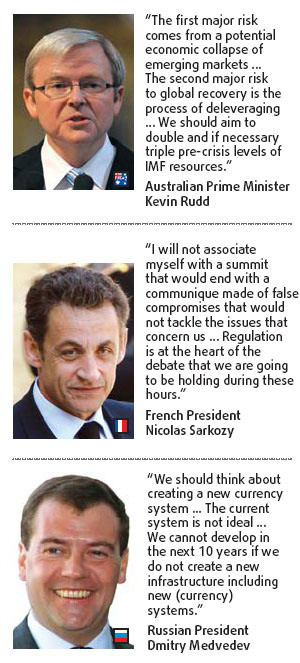|
![Chinese President Hu Jintao (4th L, 1st row) and other leaders attending the Group of 20 summit pose for group photos during a reception hosted by Queen Elizabeth II in London, Britain, on April 1, 2009. [Xinhua] Chinese President Hu Jintao (4th L, 1st row) and other leaders attending the Group of 20 summit pose for group photos during a reception hosted by Queen Elizabeth II in London, Britain, on April 1, 2009. [Xinhua]](http://images.china.cn/attachement/jpg/site1007/20090402/0011111fa1560b3ec08c08.jpg)
|
|
Chinese President Hu Jintao (4th L, 1st row) and other leaders attending the Group of 20 summit pose for group photos during a reception hosted by Queen Elizabeth II in London, Britain, on April 1, 2009. [Xinhua] |
Leaders from the Group of 20 (G20) rich and emerging nations arrived yesterday in London for a summit that aimed to reach an agreement over pulling the world out of the worst crisis since the 1930s.
Leaders were busy holding bilateral talks with one another and called for unity to handle the crisis.
But differences are visible, with the United States and the United Kingdom pitted against the European countries over the balance between extra financial stimulus and the need for regulation, as emerging countries call for a bigger say.

French President Nicolas Sarkozy, who has threatened to walk out of the summit, said yesterday that neither France nor Germany was satisfied with current proposals for an accord at the summit and warned that he would not accept any "false compromises".
"I will not associate myself with a summit that would end with a communique made of false compromises that would not tackle the issues that concern us," he told Europe 1 radio in an interview.
"Regulation is at the heart of the debate that we are going to be holding during these hours," he said.
US President Barack Obama and British Prime Minister Gordon Brown, who is struggling to bridge the G20 summit gap, played down the differences but not the scope of the crisis that the summit will have to confront.
"Make no mistake, we are facing the most severe economic crisis since World War II, and the global economy is now so fundamentally interlinked that we can only meet this challenge together," Obama said.
But he insisted that while the summit had a duty to produce "the most substantive outcome possible", the "separation between the various parties has been vastly over-stated".
Obama has said stimulus and regulation are needed but the US could not shoulder all the responsibility for creating new growth.
German chancellor Angela Merkel voiced her concern before leaving Berlin.

"I am going to London with a mixture of confidence and concern. Concern on one hand on whether we can really react to the serious situation ... Confident, however, that ... we cannot stick our heads in the sand," she said.
Merkel has spoken out against governments like the US and Britain spending their way out of the crisis.
But her fears were dismissed by Japanese Prime Minister Taro Aso, whose country has spent massively over the past decade, seeking to reignite the economy.
"Because of our experience of the past 15 years, we know what is necessary, while countries like the US and European countries may be facing this sort of situation for the first time," Aso told the Financial Times newspaper.
President Hu Jintao called for reform and efforts against protectionism.
"The international financial system should undergo necessary reforms in a comprehensive, balanced, gradual and effective manner to prevent a similar crisis in the future," the Xinhua News Agency quoted him as saying.
The summit, which aims to reach an agreement on revitalizing the global economy and reforming the world financial system, is billed as a watershed in efforts to battle the worst economic downturn in more than 60 years.
In the eyes of academics protectionism is the biggest plague.
More than 2,000 dignitaries and academics, including a Nobel prize-winning economist, signed a petition warning against "dangerous and foolish" protectionism and equating free trade with peace, mutual understanding, and global economic benefit.
Vernon Smith, winner of the Nobel Prize for Economics in 2002, was among those urging world leaders to promote peace and prosperity through a "common culture of commerce" in an open letter to G20 governments ahead of their summit today.
Drafted by the UK-based think tank International Policy Network, the petition warns that "the spectre of protectionism is rising".
"It is always a dangerous and foolish policy, but it is especially dangerous at a time of economic crisis, when it threatens to damage the world economy," the petition said.
World stocks kicked off the new quarter with strong gains in Japan but sharp losses in Europe after registering their best monthly performance since December 1999.
Investors were focusing on the summit.
"The danger is that the outcome vastly disappoints the hype," Gary Dugan, chief investment officer of Merrill Lynch Global Wealth Management, said in a preview note.
(China Daily via agencies April 2, 2009)